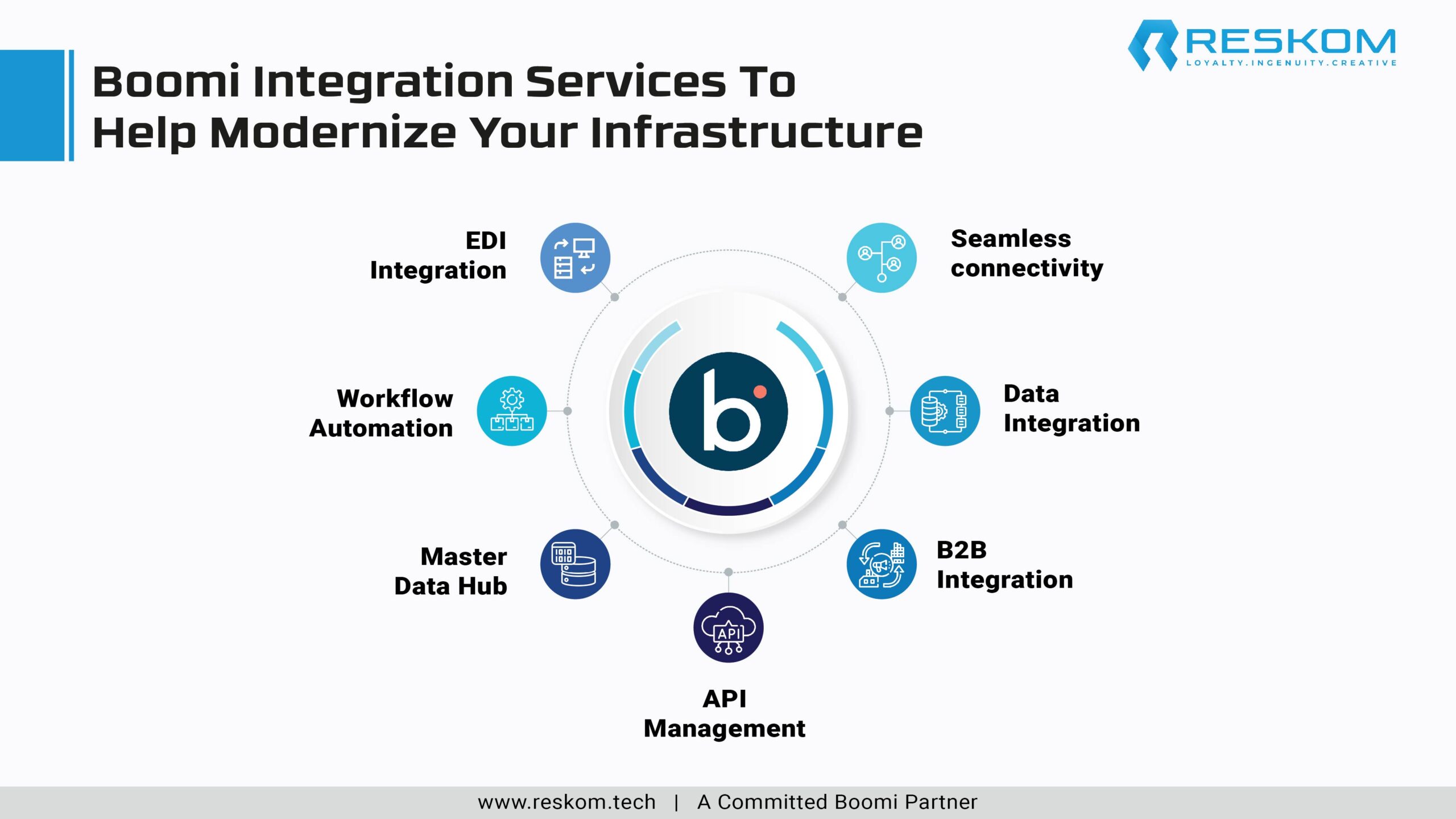For businesses to stay ahead of the evolving customer expectations and outperform their rivals, they need to embrace new technologies consistently. However, there are numerous companies facing challenges in adapting due to outdated legacy systems that hinder their ability to innovate and grow. A recent survey by IDG revealed that 89% of businesses either have plans to or have already implemented digital-first strategies, highlighting the importance of modernizing infrastructure. This article will explore the significance of infrastructure modernization and introduce Boomi Integration as a robust solution for enhancing and optimizing your IT framework.

What Is Infrastructure Modernization?
Infrastructure modernization involves the process of updating and enhancing IT infrastructures to align with current technology trends and business needs. By implementing modern systems, organizations can reduce security risks, improve scalability, and enhance overall productivity.
The Need for Infrastructure Modernization in Today's Business Environment
In these changing times in business, companies must focus on agility, flexibility, and innovation in their operations if they are to remain competitive. An updated infrastructure allows businesses to act more quickly when markets shift, and create better customer experiences than their rivals while also staying ahead of them.
A recent report by Gartner points out that “By the year 2025, more than 75% of data produced by businesses will be generated and managed outside of conventional data centers or cloud systems, a significant increase from the less than 10% recorded in 2018.” Thus, this transition requires organizations to use flexible and scalable infrastructure to manage distributed data processing and analysis.
Introducing Boomi Integration - A Perfect Platform for Modernizing Your Business Infrastructure
Boomi Integration is a leading iPaaS (Integration Platform as a Service) solution that facilitates the process of integrating data and applications across cloud-to-cloud, cloud-to-on-premises, and on-premises-to-on-premises systems. With its rich capabilities and track record, Boomi Integration offers several advantages for those organizations interested in updating their infrastructures.
Key benefits of Boomi Integration include
Scalability: Boomi Integration supports businesses as they grow, allowing them to expand into new markets and adopt new technologies without sacrificing performance.
Agility: Boomi enables businesses to adapt quickly to changing market conditions, customer demands, and regulatory requirements.
Ease of use: Boomi’s intuitive interface and drag-and-drop functionality empower users to build integrations efficiently and effectively.
Cost-effectiveness: Boomi Integration eliminates the need for expensive hardware and maintenance costs associated with traditional integration methods.
Boomi Integration Features and Benefits
Seamless Connectivity
Boomi Integration enables seamless integration between disparate systems, applications, and data sources, regardless of their location. This ensures smooth communication and data exchange across your entire IT ecosystem.
A recent study found that organizations using iPaaS solutions like Boomi Integration experienced a 65% reduction in integration development time and 410% ROI.
Low-Code Development
Boomi’s low-code development environment allows businesses to build integrations quickly and efficiently, reducing the need for extensive coding knowledge and accelerating time-to-market.
Real-Time Data Synchronization
Boomi Integration synchronizes data in real-time, ensuring that businesses have access to accurate and up-to-date information for informed decision-making.
Scalability and Flexibility
Boomi’s ability to scale with the growing needs of businesses makes it an ideal choice for organizations seeking to expand their operations and adopt new technologies.
Different Types of Boomi Integration
Boomi Integration offers various integration options tailored to specific business needs:
Application Integration: Boomi makes it easier to connect different software programs, such as ERP systems, CRM platforms, and old applications, in order to make business operations more efficient and boost output.
Data Integration: Boomi has the ability to combine data from various sources, like moving data from one system to another, managing data quality, and organizing master data, to guarantee that the information within the company is always accurate and dependable.
B2B Integration: Boomi allows for smooth communication and cooperation with outside partners, vendors, and clients by providing secure and effective solutions for inter-business integration.
API Management: Boomi API Management provides organizations with tools to design, publish, manage, and analyze APIs (Application Programming Interfaces). This service empowers businesses to expose their digital assets securely, enable interoperability between systems and applications, and drive innovation through API-led connectivity.
Master Data Hub: Boomi Master Data Hub offers a centralized platform for managing and governing master data across the enterprise. This service ensures data consistency, integrity, and quality by providing capabilities for data profiling, cleansing, enrichment, and synchronization, thereby improving decision-making and operational efficiency.
Workflow Automation: Boomi Workflow Automation enables organizations to automate business processes and workflows across systems, applications, and departments. This service enhances efficiency, reduces manual effort, and accelerates time-to-market by automating repetitive tasks, orchestrating complex processes, and enforcing business rules.
EDI Integration: Boomi EDI Integration simplifies the integration of Electronic Data Interchange (EDI) transactions with business applications and processes. This service supports various EDI standards and protocols, allowing organizations to seamlessly exchange electronic documents with trading partners and comply with industry regulations.
These Boomi Integration services offer comprehensive solutions to modernize infrastructure, streamline operations, enhance connectivity, and drive digital transformation across organizations.
The Impact of Boomi Integration on Your Business
The integration of Boomi can have a positive effect on your business by providing a variety of advantages for companies seeking to update their infrastructure, such as:
Increased Productivity: By automating manual tasks, minimizing mistakes, and speeding up time-to-market, businesses can achieve higher operational efficiency and save on costs.
Enhanced Flexibility: Boomi allows businesses to easily adjust to fluctuations in the market, customer needs, and regulatory standards, guaranteeing flexibility and promptness.
Superior Understanding: By having access to integrated data and comprehensive analytics, businesses can confidently make informed decisions based on data for strategic development.
Conclusion
Making your business’s tech better is key if you want to keep up in today’s online world. Boomi Integration is here to help. It’s a super tool that makes your IT better by connecting everything easily, lets you build stuff with less coding, updates data all the time, and can grow and change as you need. With Boomi Integration, your work gets faster, you can move quicker, and you understand more to help your business do even better.
Ready to Learn More?
Find out how Boomi Integration can make a difference for you. Check out stories of how it’s helped others, read up on its features, or talk to an expert about what Boomi Integration can do. Don’t stick with old systems that slow you down. See how Boomi Integration can change your game today.


